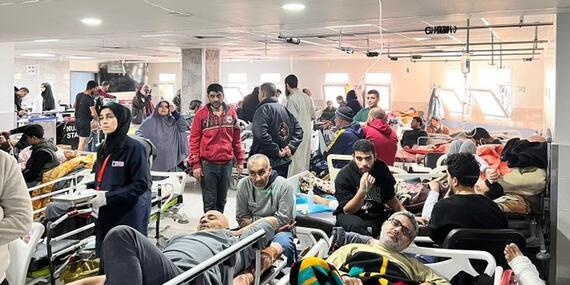Today's top news: Occupied Palestinian Territory, Myanmar

Occupied Palestinian Territory
Efforts are underway to restore telecommunications services, on the fifth day of a shutdown that has hindered humanitarian operations and access to information.
Since yesterday, humanitarian supplies have entered Gaza through both the Rafah and Kerem Shalom crossings. While this is a positive development, the conditions to deliver humanitarian operations at a scale that respond to people’s needs still do not exist, as the fighting continues.
On Friday, the World Food Programme through its partners distributed more than 9,000 hot meals to internally displaced people in three locations in Rafah and Deir Al Balah. Together with UNRWA, WFP are bringing in and distributing flour and other supplies to bakeries south of Wadi Gaza.
And on Saturday, a joint UN mission reached Al-Shifa Hospital in north Gaza to deliver health supplies and assess the situation. The team brought medicines, surgical supplies, orthopedic surgery equipment, and anesthesia materials and drugs for about 500 people.
It’s the third humanitarian convoy that has managed to reach north Gaza since fighting resumed after the humanitarian pause ended on December 1st.
The World Health Organization reports that Al-Shifa Hospital is only minimally functional. The UN team that reached the hospital on Saturday described the emergency department as a "bloodbath," with hundreds of injured patients and more arriving every minute.
As hostilities continue and health needs increase, it is critical that Al-Shifa and other hospitals across the Gaza Strip are urgently restored.
Myanmar
The UN and our humanitarian partners today published the Humanitarian Needs and Response Plan for the country for 2024. The Plan paints a grim picture of the humanitarian situation in the country three years after the military takeover.
A third of the population – or 18.6 million people – needs humanitarian assistance. This is a million more people than last year and almost 19 times the number of people requiring assistance before the military takeover.
Children are bearing the brunt of the crisis. Some six million of them need aid due to displacement, interrupted health care and education, food insecurity and malnutrition, as well as protection risks, including forced recruitment and mental distress.
The economic situation is placing families in increasing financial distress.
Interruptions to agriculture, as well as rapid inflation, are making it increasingly difficult for people to access and afford adequate food, raising the spectre of increased malnutrition.
The health system is in crisis and millions are without safe shelter or drinking water.
Women, girls, people with disabilities and stateless Rohingya people are among those impacted the most by this dangerous environment.
In the face of soaring needs, humanitarians have prioritized 5.3 million people for urgent assistance in 2024 and will need US$994 million.
